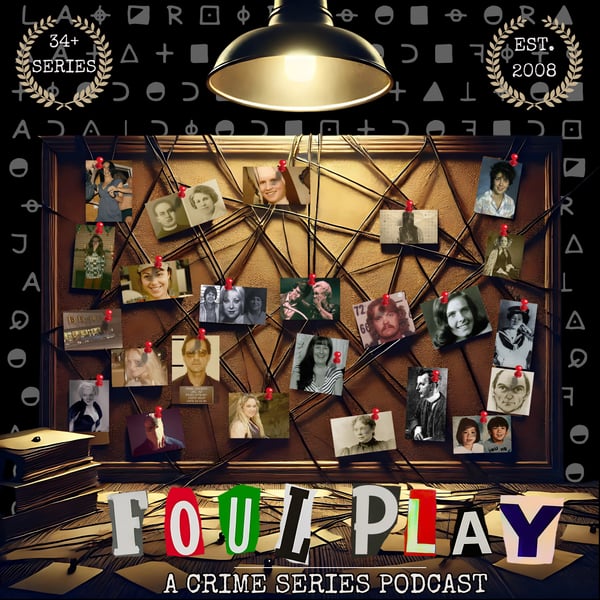S36 Ep1: Serial Killers in History – Locusta of Gaul: Rome’s Imperial Poisoner
Foul Play: Crime Series
Shane L. Waters, Wendy Cee, Gemma Hoskins
4.4 • 986 Ratings
🗓️ 5 June 2025
⏱️ 25 minutes
🧾️ Download transcript
Summary
Poison seeped through the marble corridors of ancient Rome—and one woman mixed every drop. In the Season 36 opener of Serial Killers in History, we track Locusta of Gaul, the herbalist-turned-assassin who helped Emperor Nero carve a blood-stained path to power.
What you’ll hear:
- How a captive chemist became the world’s first documented serial killer
- Deadly dinners: the mushroom that felled Emperor Claudius and the draught that doomed Britannicus
- The Senate’s panic and the birth of Rome’s anti-poison laws
- Modern forensic insights that finally decode Locusta’s toxic recipes
Stay to the end for a teaser of Episode 2—Paris’s infamous Affair of the Poisons.
🔍 Visit us online: http://foulplaypodcast.com/locusta
🎧 Listen now on Apple, Spotify, or wherever you get your true crime fix.
#FoulPlayPodcast #SerialKillersInHistory #LocustaOfGaul #TrueCrime #HistoryNerd
Our Sponsors:
* Check out Warpath: https://bit.ly/4ixJCm3
Support this podcast at — https://redcircle.com/foul-play-crime-series/donations
Advertising Inquiries: https://redcircle.com/brands
Privacy & Opt-Out: https://redcircle.com/privacy
Transcript
Click on a timestamp to play from that location
| 0:00.0 | Hello, friend. Welcome to Falplay. Throughout human history, certain individuals have committed |
| 0:28.1 | horrific acts that both terrify and fascinate us. From the streets of Victorian London to modern-day metropolises, serial killers have left their |
| 0:40.7 | dark mark on society, leading to significant changes in law enforcement and criminal psychology. |
| 0:48.6 | The term serial killer was coined in the 1970s, but these criminals existed long before we had a name for |
| 0:56.6 | them. In the late 1800s, Jack the Ripper became one of history's most notorious murderers, |
| 1:04.7 | killing at least five women in London's Whitechapel District. His identity remains unknown to this day, |
| 1:13.9 | making him one of crime history's greatest mysteries. |
| 1:18.0 | The 20th century saw a dramatic increase |
| 1:21.2 | and documented serial killers. |
| 1:24.3 | The 1950s brought us the story of Ed Gein, whose grotesque crimes inspired numerous horror films, |
| 1:33.2 | including Psycho and the Texas Chainsaw Massacre. |
| 1:37.4 | The 1970s witnessed a surge of serial killers, including Ted Bundy, who used his charm and good looks to lure victims, |
| 1:48.0 | and John Wayne Gacy, who killed 33 young men while maintaining a respectable facade as a community volunteer. |
| 1:58.9 | Law enforcement's approach to catching these criminals evolved significantly |
| 2:04.7 | over time. The development of criminal profiling began with the FBI's behavioral science |
| 2:11.8 | unit in the 1970s, revolutionizing how we hunt serial killers. |
| 2:19.5 | The emergence of DNA testing in the 1980s provided another powerful tool, |
| 2:27.0 | helping solve both active and cold cases. |
| 2:33.0 | Female serial killers, though less common, have also left their mark on history. |
| 2:39.3 | Eileen Warnas became one of the most notorious killing seven men in Florida between 1989 and 1990. |
| 2:47.9 | Unlike many male serial killers who are motivated by sexual gratification, |
| 2:52.8 | female perpetrators often kill for financial gain or revenge, |
... |
Please login to see the full transcript.
Disclaimer: The podcast and artwork embedded on this page are from Shane L. Waters, Wendy Cee, Gemma Hoskins, and are the property of its owner and not affiliated with or endorsed by Tapesearch.
Generated transcripts are the property of Shane L. Waters, Wendy Cee, Gemma Hoskins and are distributed freely under the Fair Use doctrine. Transcripts generated by Tapesearch are not guaranteed to be accurate.
Copyright © Tapesearch 2025.

